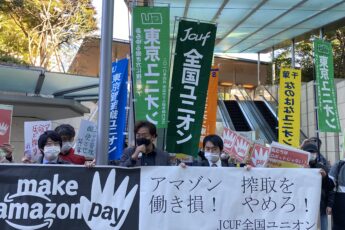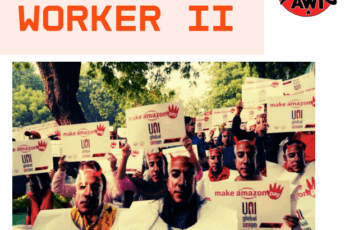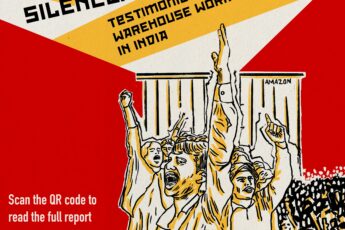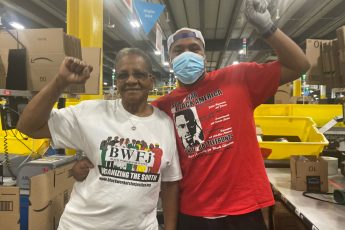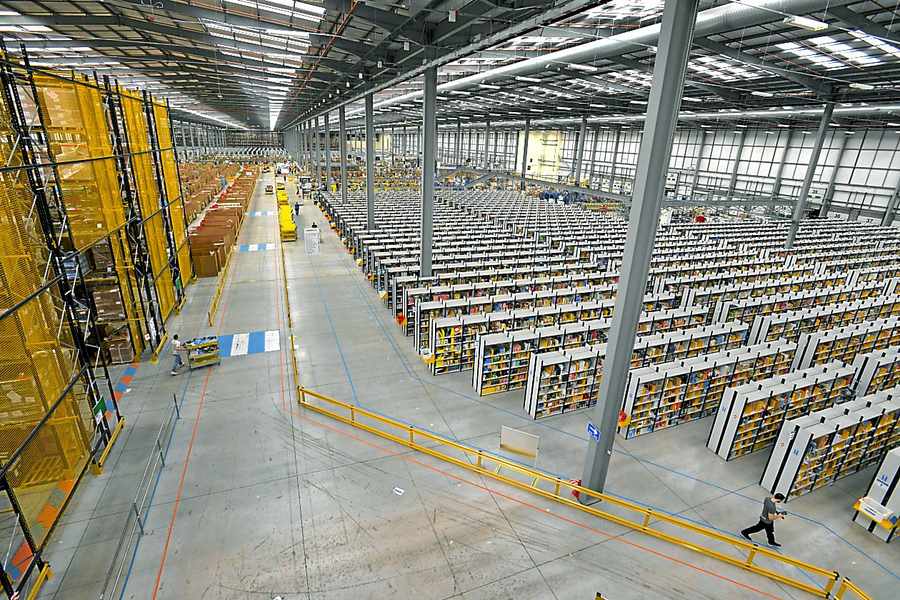
by PLATEFORM D’ENQUÊTES MILITANTE S
We publish the English translation of parts of an interview to Anton Kramer, member of the Amazon solidarity network in Leipzig, made by the Plateforme d’Enquêtes Militantes. The interview underlines the need of organizing across the borders against the logistic transformation of the command over workers and the imposition of the most brutal forms of exploitation, that find in Amazon a crucial field of application. On the table of the discussion there is also the role of the Transnational Social Strike platform as a political infrastructure that can allow to build a common strategy against fragmentation within and without the workplaces. As the experiences of communication among Amazon workers across Europe and the wave of strikes in several locations during the Black Friday and in these days show, the question of how to strengthen political connections inside and outside the warehouses is the first issue to address. As Anton suggests, this question overcomes logistics as a sector, because it rather lies at the core of any kind of opposition to the current alliance between neoliberalism and nationalism which characterizes the rise of the new right. Besides, it is a key challenge for any movement that does not want to close itself into restricted milieus of activists but aims at enlarging and expanding itself.For this reason, we welcome Anton’s analysis and invite all those sharing these challenges to get involved or to strengthen their engagement in the platform. We take the opportunity to underline that the TSS is an open platform, where the decision-making process is organized through monthly skype calls and a mutual exchange among all those aiming at fostering and inventing a free and autonomous communication among precarious, migrants, industrial workers from different sectors. Giving resonance to the voice of these very subjects is for us a question of political priorities: if we recognize the transnational scale as the one from which to wage our struggle against exploitation, the important everyday work of building up solidarity with the struggles organized inside the single workplaces cannot replace the work of transnational organization and elaboration of a common strategy. We believe in the need to continue this discussion and we are working to create the conditions for a broader transnational meeting focusing on logistics as a logic of exploitation, as well as on the tools of organization and the strategical perspectives. Stay tuned!
You can find the complete text on the interview in French on the website of the Plateformed’EnquêtesMilitantes.
Plateformd’Enquêtes: Can you tell us something about your political history and how you became active as solidarity network?
Anton: Before being active in the solidarity network to support the strikers, many of us were organized in the typical groups of the radical left, making conferences once a year, then,eventually and in the best case, organizing a demonstrationin order to build a convergence for an annual campaign. We have enough of this kind of politics, because it lacks mainly two things. On the one hand, this radical left politics is carried out always within a certain milieu that involves leftist students and their friends. Who else would come to conferences on the European financial crisis, on the concept of racism or the critique of parliamentarism? Who else would take part in our demonstrations and would not consider them as a bothersome interruption of window shopping? I would not reject these two forms of political practiceper se, but they have to be part of a more general strategy. On the other hand, that very strategy is missing. In our solidarity network we can’t say to have reached a fully developed strategy, but I think we have an idea.
PE: Amazon is the expression of a new configuration of the forms of production and distribution of digital capitalism in the XXI century.How do you read the Amazon phenomenon within the framework of digital capitalism?
A: In the labor process in Amazon we actually find a new type of control. The portable scannersbond the workers to a global network that directs his or her labor and, more precisely, his or her movements, with the help of an inaccessible algorithm. The workers are invited to switch off their brains and act as robots. Moreover, there is abundant evidence that Amazon collects more personal information than it confesses to. Otherwise one could not explain why the chiefs of staff and supervisors have so much information on the workers. At the same time, Amazon applies classical, almost anachronistic forms of control. The workers are split in small groups, each having its own supervisor. The latter controls and bothers the workers. Starting from the information collected, the workers are called to take part in feedback interviewswhere they have to account for their performances, through which they are put under pressure.
Of coursethese forms of control piss the workers off! The digital surveillance used within the warehouses risks to become the rule. The human surveillance can be evaded or negotiated – something that becomes impossible with the algorithm. As we have seen, Amazon can measure the performance of each worker during his or her work time and use that knowledge in order to increase pressure.
At the same time, the workers in Amazon move around in isolationthroughout the warehouse, there is not such a bondage to the chain as in classical Fordism. This is due to the fact that capital had to change its ways of exercising control. Capital will try to test and perfect these ways in this sector, and then spread them also in other sectors. The fragmentation of labor is a general tendency of our time. It is unsettling that thousands of workers circulate within the warehouses in an isolated way and that a brief discussion lowers the performance. The chiefs wait in the corners in order to prevent conversations.
But it is also important for us to underline that all this process is the effect of the human action and that we can defend ourselves! If the workers in Amazon lower collectively the work speed, something that can be done simply by appealing to a strict respect of security measures, then they can constantly disturb the production process.
PE: The employment through temporary contracts or seasonal contracts in the Christmas period, as well as the repression against unions, seem to make impossible union organizing in the long run. How were you able to establish organizational power and how do you see the possibility of an interaction between unionism and the radical left? What strategic role do you ascribe to logistics? Could we see the solidarity platform as a part of a renewed interest of the German radical left in social struggles?
A: The organizational power is a problem. I do not want to talk aboutnumbers, I would rather speak about Amazon’s practices which aim to reduce it. The company tries in many ways to get rid of the permanent workers, whose level of organization is no doubt much higher. The company sends warning letters even for little mistakes and openly offers money for the permanent workers to resign. Maybe the level of organization is not even the main problem. Amazon employs an increasing number of precarious workers so that the level of relative organization will gradually decrease, especially during the Christmas period, and so that conflict’s effects are reduced to the minimum. These strategies do not exist just in Leipzig, but they are confirmed also by the colleagues in Poznan. Moreover, the trade union starts each time from the beginning in every new warehouse. People who start working there do not have any experience of trade unionism. Almost every year Amazon opens a new warehouse somewhere in Europe and in the rest of the world. Every new warehouse increases the pressure on the others.
In many of these warehouses the unhappy workers get togetherand try to change something. In Leipzig the workersare fighting inside the DBG’s Ver.di trade union. An option is that we as Left militants start to work at Amazon too. The expected requirements are not too high, but it is difficult to assess how much one can last in this kind of job. We chose an option which was closer to our life’s conditions. We work with the strikers and especially with the trade union delegates, the Ver.di representatives elected in the enterprises, some of whichreallyappreciate us. We decide the strategy all together. The workers have realized that they need support in their labor struggle outside the company, or at least that it is useful. The delegates expect us to support them in view of the public campaigns. Five years ago, when the first generation presented themselves tothe strikers with some coffee, they were still wondering what we, as students, were doing there.
Regarding our biographies, some of us took part in a kind of «wave». Specifically, the labor strugglesin France actually inspired the Left in Germany. Most of us were doing a different political activity before. Nevertheless, regardless to that current tendency to be involved in social fights in the work sector, we have realized that our political activity never went beyond the boundaries of our milieu. We have almost never tried to build contacts beyond our networks. Instead, these relations are exactly the basic conditions for social change.
PE: Amazon can quickly react to the strikes by displacing the orders, for instance towards the Fulfillment Center of Poznan in Poland. What is the role of the solidarity networks in the creation of transnational networks like the Transnational Social Strike (TSS)? What is the outcome of the transnational cooperation between the strikers in Leipzig and the Polish ones?
A: One thing is certain: the international network is very important in that struggle, for the evoked reasons, not just because Amazon is an enterprise that actson a transnational scale, but also because national workers are put against each other. Even institutional trade unions as Ver.di have understood that. Once international networks are formed, two levels must be distinguished. There is a cooperation at the secretaries’ level and there is the European precarious workers’ level – and here we come into play. We cannot say a lot on the first level, considering that we are an alliance close to the trade unions, butexternal to them.
When we were not yet engaged in the solidarity network in support of the strikers, some of us took part in the second meeting of the Transnational Social Strike in Poznan in 2015. We consider that idea very important: it is about pushing forward the constitution of class connections on the transnational level. However, having taken part in other meetings, we think that the alliance is not enough organized for us yet and that the decisions seem to be too opaque for people like us who do not have a lot of time to get involved in that context. The different time resources have always been a problem in the big alliances like that. But as soon as I will have more time, I will try to go to the meetings and to be more active.
It was thanks to those meetings that we met the Workers’ Initiative’s colleagues in Poznan, but also German colleagues, like those from Bad Hersfeld. During these meetings, there is an interesting atmosphere because there are people who have understood that it makes no sense to limit the political action at a national level – at least in certain sectors. For sure, we canmore easily discuss with the Bad Hersfeld colleagues, but the organizational form must be immediately transnational.
At the same time, it is our need and that of Workers’ Initiative, that the workers of Leipzig and Poznan meet with each other. For Workers’ Initiative it is easier because it is the majority union in the warehouse. It is very good to tell the workers in Leipzig that there is a grass-root union in Poznan whose members risk their jobs making slowdowns in order not to become strikebreakers. But there is yet another reason why the comrades from Poznan land here. A delegation was present during the sit-in of the strikers in Leipzig on October 30th 2017. We have discussed directly with the comrades and have written 95 theses against Amazon. Later on there has been a more restricted meeting that has allowed us to think about some concrete steps. Finally, there will be a transnational meeting of Amazon workers at the end of January 2018 in Leipzig. We hope that there will be comrades from Germany, Poland, but also France, Italy – there have been strikes there as well – England and Spain.
In a world organized in nation-states, the majority of people do not think beyond the borders, while capital and politics have transnationalized themselves since a long time. As a consequence, such meetings are important. They smash the national conscience! Through these meetings we realize that nationalism goes against the interests of workers in these sectors.
PE: Amazon follows a strategy according to which it opens new warehouses in regions which are strongly hit by unemployment, in order to reduce the costs of the labor force, relying on a «reservoir army». What relationship do you see between the struggles within Amazon and the success that the AFD party has had in the region? In Saxony, the party has gained its best result, obtaining the 27% of votes at the last national ballots. What role does the struggle against the nationalist and neoliberal Right play within the conflict with Amazon?
A: Well, it is true that Amazon tries to pay the labor force the least possible. A low level of average wage and a low cost of living are very positive factors for establishment for companies like Amazon. Then it is also important for the sites to be in strategic spots. The warehouses in Poland are placed close to the German border, while the access to a migrant labor force would have been easier if the warehouse were close to the border with Belarus or Ukraine. We need to consider that from Poland Amazon delivers mainly commodities for the German market.
In Germany Amazon warehouses are distributed in the whole country, in favorable points of circulation. Obviously, they are not in Hamburg, Munich, Frankfurt or Berlin – except for the new warehouses for the food delivery –, but in small cities and villagesin the surrounding area as Winsen, Graben, Bad Hersfeld or Briselang, where the cost of living is lower. In this regard Leipzig is an exception. From the alternative and hipster neighborhoods to the warehouse it takes ten minutes by bike. This makes our job way easier.
The Amazon strikers we are in contact with are in the majority members of the Left party (Die Linke). There are also AFD voters among the strikers. They do not find so cool that 150 leftists show up for a strike. As far as I know they don’t seem the majority. Even though the reasons for the rise of the New Right are more complex, two of them are related to our political work.
On the one hand, let’s consider the fact that the rise of the New Right is a consequence of the political experiences of the post-unification period. The deindustrialization, neoliberalisation and creation of a sector of low wage workers have very concrete effects on the daily lives of many people. These people have been let down by the leaders of the progressive left that ruled Germany in the last years and vote for the AFD as a vote of protest. Many have also racist and nationalist tendencies and might belong to the groups that, since 2013, have started fires in front of the refugees’ reception centers.
Besides, there are not left-wing answers to the social crisis. Meanwhile, the workers’ associations are but rarely carrying out successful strikes. It is a perfect exception the fact that, for six years, Ver.di is putting so much energy in the workers’ struggle. The experience of success against capital, even if wearetalking about just small conflicts, is very important to build a left movement. The last big movement in Eastern Germany, not coming from the right – so neither Pegida nor nationalist processions – was the protest against Hartz IV, the labor code reform, similar to the El Khomri law in France. Clearly these laws are still in place, but in the end the State has simply faced those protests through a wait-and-see attitude. The people do not forget.
To sum up, our answer to the neoliberal individualization and to the racist outcomes of experiences of suffering is a jointed and transnational class politics. But we are at the beginning and we need to develop that answer in our struggle.


